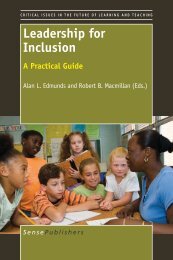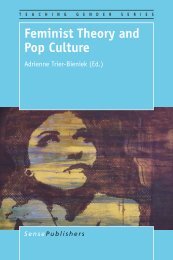CHANGING OUR MINDSMight a learner revert to former ways of knowing after crossing a <strong>threshold</strong>? Incharacterising <strong>threshold</strong> <strong>concepts</strong> as ‘irreversible,’ Meyer <strong>and</strong> L<strong>and</strong> (2003) suggest‘that the change of perspective occasioned by the <strong>learning</strong> of a <strong>threshold</strong> concept isunlikely to be forgotten, or will be unlearned only by considerable effort’ (p. 4).Baltas (2007) would call the impossibility of “forsaking the ‘Eureka!’ experience”<strong>and</strong> returning to previous ways of underst<strong>and</strong>ing an ‘irreversible achievement’ (p. 76).Thus, on a path of development from one way of knowing <strong>and</strong> meaning-making,one epistemic stage or stance to the next, there seems to exist a point in our journeywhen we cross a <strong>threshold</strong> <strong>and</strong> our old way of knowing is no longer ‘tenable’.There is an irreversible shift in the way in which ‘essence’ is coordinated. Thereemerges a new space from which to observe <strong>and</strong> analyse the world.Accompanying the new, however, is a loss of the old: old ‘status,’ old ‘identitywithin the community’ (Meyer <strong>and</strong> L<strong>and</strong>, 2005, p. 376), old ways of knowing,seeing, <strong>and</strong> being in the world. As we saw earlier, these liminal spaces where oneis ‘betwixt <strong>and</strong> between’ ways of knowing are underst<strong>and</strong>ably deeply emotional,sometimes ‘painful’ (Boyd <strong>and</strong> Myers, 1988, p. 277; Love <strong>and</strong> Guthrie, 1999, p. 72),sometimes exhilarating. They are spaces where ‘the individual is naked of self –neither fully in one category or another’ (Goethe, 2003. In Meyer <strong>and</strong> L<strong>and</strong>, 2005,p. 376). Yet, this state of liminality does not as yet represent the new developmentalstage, for, as Kegan (1982) reminds us, ‘development is not a matter of differentiationalone, but of differentiation <strong>and</strong> integration’ (p. 67; emphasis in original).THE INTEGRATIVE NATURE OF THRESHOLD CONCEPTS, OR,ON INTEGRATIONThe integration after differentiation of which Kegan (1982) speaks is the act ofreorganising the essence of one’s way of knowing into a new balance. And, asLewis (2000) notes, self-organisation is a cross-scientific principle which ‘explicatesthe emergence of order in physics, chemistry, biology, ecology, <strong>and</strong> cosmology’(p. 40). In describing <strong>threshold</strong> <strong>concepts</strong> as ‘integrative,’ <strong>and</strong> thereby ‘expos[ing]the previously hidden interrelatedness of something’, Meyer <strong>and</strong> L<strong>and</strong> (2003, p. 4)have captured the acts of reorganisation <strong>and</strong> accommodation (Piaget, 1950) thatoccur when individuals modify their existing cognitive structures to make senseof the external world. Perry (1970) remarks that these reorganisations are“sometimes […] sensed as a ‘realization.’ This is particularly likely in respect to aninsight or reconstruction that suddenly reveals ‘the’ meaning of some incongruityof experience we have been trying for some time to make sense of ” (pp. 41–42).Meyer <strong>and</strong> L<strong>and</strong>’s notion of integration is not purely cognitive, however, for itrefers to the ‘indissoluble interrelatedness of the leaner’s identity with thinking <strong>and</strong>language’ (2006, p. 21). The integrative nature of <strong>threshold</strong> <strong>concepts</strong> is thus alsoa matter of integrity – of the creation of a coherent way of knowing <strong>and</strong> being inthe world. Boyd <strong>and</strong> Myers (1988) capture the emotion that characterises the final,integrative, phase of the grief work involved in <strong>transformational</strong> education as‘movement […] between a hope-filled sense of restabilization <strong>and</strong> reintegration ofidentity’ (p. 279).13
TIMMERMANSWe may turn now to the ‘newness’ of what has emerged through qualitativechange. Wood (1998) emphasises that ‘the emergence of what is qualitatively new’may be ‘understood in terms of the specific essence of that which is in processrather than in terms of general laws applying to simple elements of which it iscomposed’ (p. 2). These qualitative reorganisations, perhaps precipitated by whatMeyer <strong>and</strong> L<strong>and</strong> (2005) term the ‘reconstitutive effect of <strong>threshold</strong> <strong>concepts</strong>’ (p. 375;emphasis added), represent the adaptation (e.g. Lewis, 2000) of an individual to hisor her environment. And our very survival (biological, academic, or otherwise)depends on our ability to respond to the dem<strong>and</strong>s of our surroundings, to our ‘lifeconditions’ (Kegan, 1994).Given the cognitive <strong>and</strong> emotional complexity involved in reorganising one’sepistemic beliefs, Dole <strong>and</strong> Sinatra (1998) comment rather unsurprisingly thatreorganisation is difficult to achieve. As educators <strong>and</strong> as disciplinary experts, wemust consider that we may hold either explicit or implicit expectations regardingthe ‘appropriate’ response or adaptation to the troublesomeness or discrepancyintroduced by a <strong>threshold</strong> concept. Our upcoming discussion of the bounded natureof <strong>threshold</strong> <strong>concepts</strong> will urge us to consider, however, that these expectationsmay arise from the multiple layers of context in which <strong>threshold</strong> <strong>concepts</strong> areembedded.BOUNDEDNESS, OR, ON CONSIDERING CONTEXTThe view of <strong>learning</strong> expressed in this chapter raises the interesting <strong>and</strong> ethicalquestion of whether development should be the aim of education (e.g. Fiddler <strong>and</strong>Marienau, 1995; Kohlberg <strong>and</strong> Mayer, 1972). This question is important toconsider because educational ideologies influence the nature of the outcomesestablished for <strong>and</strong> valued in learners (Kohlberg <strong>and</strong> Mayer, 1972). Moore (2002),commenting on the inherently developmental nature of <strong>learning</strong>, states thataccording to Perry <strong>and</strong> other researchers, ‘true education, especially liberal artseducation, was fundamentally about this kind of development – namely, theevolution of individuals’ thinking structures <strong>and</strong> meaning making toward greater<strong>and</strong> more adaptive complexity’ (p. 26).Conceived of in this manner, the purpose of education is much less aboutfostering growth in what learners know than facilitating development of the waysin which they know. Such a perspective may partially allay Meyer <strong>and</strong> L<strong>and</strong>’s (2005)concern about <strong>threshold</strong> <strong>concepts</strong> being perceived as prescribing a rigid, unidirectionalpath toward achievement of particular goals, such as degree achievement orprofessional accreditation. Focusing on <strong>threshold</strong> <strong>concepts</strong>’ potential to instigateepistemological transformation enables us to emphasise <strong>learning</strong> as ‘entranceinto […] a community of people who share that way of thinking <strong>and</strong> practising’(Davies, 2006, p. 71).While it may seem nobler to discuss the development of ways of knowing <strong>and</strong>being, rather than the content of knowing, as the aim of education, we must firstclarify an important matter. The preceding discussion of essence <strong>and</strong> end points,of transitions, trajectories, <strong>and</strong> <strong>threshold</strong>s in the development of epistemic beliefs14
- Page 1 and 2:
EDUCATIONAL FUTURES: RETHINKING THE
- Page 3 and 4:
EDUCATIONAL FUTURESRETHINKING THEOR
- Page 5 and 6:
A C.I.P. record for this book is av
- Page 7 and 8:
TABLE OF CONTENTS10. Threshold Conc
- Page 9 and 10: Pax Intrantibus Salus Exeuntibus. L
- Page 11 and 12: LAND ET ALstudents experience diffi
- Page 13 and 14: LAND ET ALModePreliminalLiminalPost
- Page 15 and 16: LAND ET AL(Barker, 1991, p.184). Th
- Page 17 and 18: LAND ET ALvariations arising from t
- Page 19 and 20: LAND ET ALform of a model of concep
- Page 21 and 22: LAND ET ALQuestions of intersection
- Page 24 and 25: EDITORS’ PREFACEstudents bring to
- Page 26 and 27: EDITORS’ PREFACEconcepts in the f
- Page 28 and 29: EDITORS’ PREFACEIn the final illu
- Page 30 and 31: EDITORS’ PREFACEhence becomes a n
- Page 32 and 33: EDITORS’ PREFACElearning. This th
- Page 34 and 35: EDITORS’ PREFACEa lens or ‘way
- Page 36 and 37: EDITORS’ PREFACEHence learning is
- Page 38 and 39: EDITORS’ PREFACEthe Communitas, w
- Page 40 and 41: EDITORS’ PREFACEBuilding on these
- Page 42 and 43: EDITORS’ PREFACECousin, G. (2009)
- Page 44 and 45: DAVID PERKINSFOREWORDEntrance…and
- Page 46: FOREWORDMeyer, J.H.F., Land, R. & D
- Page 50 and 51: JULIE A. TIMMERMANS1. CHANGING OUR
- Page 52 and 53: CHANGING OUR MINDSKegan’s (1982)
- Page 54 and 55: CHANGING OUR MINDSKegan describes e
- Page 56 and 57: CHANGING OUR MINDSIn fact, Kegan an
- Page 58 and 59: CHANGING OUR MINDSat the epistemolo
- Page 62 and 63: CHANGING OUR MINDSreveals an additi
- Page 64 and 65: CHANGING OUR MINDSBendixen, L. D.,
- Page 66: CHANGING OUR MINDSSibbett, C., & Th
- Page 69 and 70: SCHWARTZMANScholarship in liminalit
- Page 71 and 72: SCHWARTZMANTC: the entityThe term T
- Page 73 and 74: SCHWARTZMANA resource for teaching
- Page 75 and 76: SCHWARTZMANunprecedented to attract
- Page 77 and 78: SCHWARTZMANspectrum of scholarship
- Page 79 and 80: SCHWARTZMANrupture and phenomenolog
- Page 81 and 82: SCHWARTZMANfield(s) of one’s cons
- Page 83 and 84: SCHWARTZMAN36DATA: PARTICULARS GIVI
- Page 85 and 86: SCHWARTZMANchallenge than interpret
- Page 87 and 88: SCHWARTZMANStrategies for Teaching:
- Page 89 and 90: SCHWARTZMANThey are redefined here
- Page 91: SCHWARTZMANLoder, J. (1981). The tr




